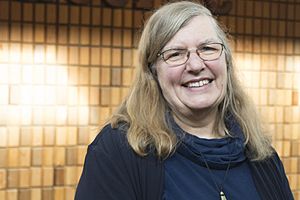Nancy Turner facts for kids
Quick facts for kids
Nancy Turner
CM OBC FRSC
|
|
|---|---|

Turner in 2015
|
|
| Born |
Nancy Jean Turner
1947 (age 78–79) Berkeley, California, U.S.
|
| Nationality | Canadian |
| Citizenship | Canada |
| Alma mater | University of British Columbia |
| Known for | compendium of aboriginal culture and plant lore in British Columbia |
| Awards | R.E. Schultes Award (1997) Order of British Columbia (1999) Canadian Botanical Association’s Lawson Medal (2002) William L. Brown Award (2008) Order of Canada (2009) |
| Scientific career | |
| Fields | Ethnobiology Ethnobotany |
| Institutions | School of Environmental Studies, University of Victoria; Department of Botany, University of British Columbia (adjunct) |
| Thesis | Plant taxonomic systems and ethnobotany of three contemporary Indian groups of the Pacific Northwest (Haida, Bella Coola, and Lillooet) (1973) |
Nancy Jean Turner (born in 1947) is a Canadian scientist. She is an ethnobiologist, which means she studies how people and cultures interact with the natural world. She has done a lot of important research with the Indigenous peoples of British Columbia. Her work helps us understand how these communities have used plants for many years.
Contents
About Nancy Turner's Research
Nancy Turner was born in California in 1947. When she was five years old, her family moved to British Columbia, Canada. She later earned a special degree called a doctorate in ethnobotany. This field combines the study of plants (botany) with the study of cultures (ethnology).
For her research, she worked with Indigenous groups like the Bella Coola, Haida, and Lillooet peoples. She would talk to older members of these communities. They shared their knowledge about plants, including their names and how they were used.
Nancy Turner's work has shown how important plants are in the cultures of these groups. She also documented how Indigenous peoples have shaped the landscape of Canada over time. Her research helps preserve valuable traditional knowledge.
Special Awards and Recognition
Nancy Turner has received many important awards for her work. These awards recognize her dedication to ethnobotany and her contributions to understanding Indigenous cultures.
The Order of British Columbia
In 1999, the Government of British Columbia gave Nancy Turner a very special award called the Order of British Columbia. This award honors people who have made outstanding contributions to the province.
The government described her work as documenting "endangered knowledge of First Nations." This means she helps record important information that might otherwise be lost. Her research focuses on how First Peoples in British Columbia used plants for food, medicine, and materials. Her work is seen as a very valuable collection of Indigenous culture and plant knowledge in British Columbia.
Other Important Awards
Nancy Turner has also received other significant honors:
- R.E. Schultes Award (1997)
- Fellow of the Royal Society of Canada (1999)
- Canadian Botanical Association’s Lawson Medal (2002)
- Killam Research Fellowship (2007)
- William L. Brown Award for Excellence in Genetic Resource Conservation (2008)
- Order of Canada (2009)
 | William Lucy |
 | Charles Hayes |
 | Cleveland Robinson |

